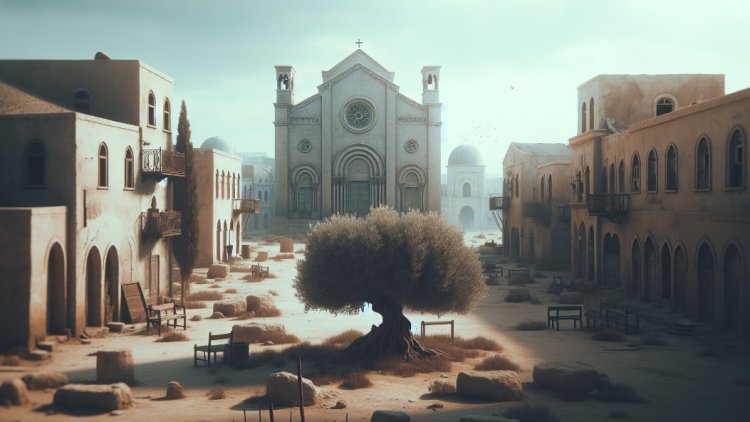The Ethnic Cleansing of Jews in Muslim Countries
Unveiling the historical complexities of Jewish communities in Muslim countries: Explore their long coexistence, periods of tension and violence, and the diverse experiences across different regions.

Introduction
Likely, you have never heard of the Farhud, the 1941 pogrom against Jews in Iraq, in which hundreds of Jews were killed. Probably, you have never heard the story of Sol Hachuel, a young Moroccan Jewish girl, only 17 years old, who was killed for refusing to convert to Islam. You may not have heard about the anti-Jewish riots in Aden, Yemen. I could go on, but I’m sure you get the picture. You probably know nothing, or very little, about this subject—the ethnic cleansing of Jews in Muslim countries.
There is this false narrative that, unlike in Europe, Jews enjoyed the same rights as Muslims in Muslim countries and that, until the rise of Zionism, Jews were able to peacefully coexist and live happily in Muslim countries. This is a lie. I mean, it was better for Jews in Muslim countries than in occupied Poland in 1943, but it was far from ideal.
Jews were never considered equal to Muslims in Muslim countries, not before colonial times, not after, not before the rise of Zionism, not after, definitely not before the establishment of the State of Israel, and certainly not after. Was it horrific? No, and I’ll come back to that shortly.
The Decline of Jewish Communities in Muslim Countries
Some of you may not like what I’m about to say and may accuse me of Zionist propaganda, so let me start with two comments. First, let’s look at the number of Jews in Muslim countries: in the 1940s, there were 35,000 Jews in Libya, and today there are none; in Egypt, there were 85,000, and today there are three; in Tunisia, there were 100,000 Jews, and today there are 1,500. I could go on to Syria, Lebanon, and Iran, but again, you get the picture. All these Jewish communities have been completely, or almost completely, destroyed.
And when the numbers are as dramatic as these, it tells us something; it’s not something we should just ignore. Communities don’t just disappear for no reason. In non-Muslim countries like the United States, France, and Canada, there were Zionist and Zionist activities, and a large portion of these communities stayed. Immigration is hard. You only resort to it when the situation is unbearable or when you think it will soon become unbearable.
And now for my second observation: If the number of Jews I just mentioned doesn't persuade you, then tell me: Can you name a minority that thrives in any Muslim nation? From Morocco in the west to Iran in the east, from Turkey in the north to Yemen in the south The number of Coptic Christians in Egypt is dwindling; Christians in Iraq are disappearing; two million have left in recent years. Iran hosts many oppressed groups that no one cares about: the Bahai, Zarathustras, and Baloch people—I know, you’ve probably never heard of them. Independent women don’t have a great time in Iran either.
Then there are the Kurds, a Muslim nation that is fighting for its independence while also suffering from oppression by other Muslims. No one takes to the streets for them, alongside them. And there are Hindus who suffer terribly in all Muslim countries. There used to be millions of Hindus in Muslim countries. They are disappearing.
They have no media coverage. I will soon make a blog about the real oppressed people in the Middle East, but now back to the main topic of this blog: the ethnic cleansing of Jews in Muslim countries.
Persecution of Jews in Yemen
Let’s start with the community that suffered the most: the Jews of Yemen. Unlike other Jewish communities, which also had their moments of prosperity, Yemenite Jews experienced either very bad or catastrophic times. They had suffered under Muslim rule for hundreds of years and were subjected to a series of anti-Jewish laws, one of which was that orphaned children had to be Muslim. This is one of the reasons Yemenite Jews got engaged and married at a very young age so that if their parents died, the children would already be part of another family.
This fact also explains why half of Yemenite Jews had already immigrated to Israel before 1948. Before the establishment of Israel. One wave of Yemenite Jewish immigration to Israel took place in 1882, the same year the first wave of Jews came from Europe in modern times. As an Israeli, I've been accused of colonialism 400,000 times. It doesn't matter that there has never been a Jewish colonial empire in Europe like the British or the French, but most of the Jews in Israel today, and even 150 years ago, came from Muslim countries.
Planes were my first love before meeting women, and I would like to share the following humorous anecdote: When an American Jew who survived pogroms comes to Israel, he is a symbol of white colonialism, and when Jews emigrate from Yemen the same year, for the same reason, they are completely ignored. In 1947, there were pogroms against Jews in Aden. About 100 Jews were killed, and no one was held responsible.
A year later, two Muslim girls drowned in a well in Yemen, and the Jews were blamed. They were arrested and fined a substantial amount. They lived in constant fear and suffered immensely. From 1949 to 1950, all the Jews—around 50,000 people—migrated to Israel.
Planes were my first love before meeting women, and I would like to share the following humorous anecdote: Most Yemenite Jews, many of whom had never seen a car before, were flown to Israel in airplanes. By the way, which airline transported Yemenite Jews to Israel? Air Alaska. I know... Golda Meir wrote in her memoir: "Sometimes I used to go to the airport to meet the Jews as they disembarked from Yemen.
Once, I asked an elderly man, 'Have you ever seen an airplane in your life?' And he said, 'No.' Then I asked, 'Weren't you afraid to fly?' And he said, 'No, as it is written in the Bible, in the book of Exodus: You have seen what I did to the Egyptians and how I bore you on eagles’ wings and brought you to myself.'"
Today, there are no Jews in Yemen. The Jews of Iran have a very long history, dating back 2,500 years. Although today Iran is the main source of evil in the Middle East, I must say that many of the supporters I have in Muslim countries come from Iran. I hope the good people in Iran will overthrow the cruel Islamist regime. I won't attempt to summarise the history of Jews in Iran, but here is a little story about the Jews in the city of Mashhad. In 1839, many years before the advent of the Zionist movement, there was a bloody defamation against Jews. 40 Jews were killed, and a few girls were abducted to become child brides to Muslims. The community was forced to convert to Islam.
For over a hundred years, the Jews kept their identities secret. They were known in Mashhad as the "new Muslims" and continued to suffer at the hands of their Muslim neighbors. The converted Jews had to open their shops on Saturdays to prove that they didn't observe the Jewish Sabbath. So, even though they opened the doors of their shops, they did their best not to sell anything to customers. After the Islamic Revolution in 1979, they all fled to Israel. There are no more Jews in Mashhad.
From Iran, let's move to the neighboring country, Iraq. I started this blog by talking about the Farhud, and the thumbnail of this blog is also from the Farhud pogrom. I'm focusing on it for two reasons. The Farhud was the largest pogrom in terms of the number of deaths. Terrible things were done to the Jews, and many women... it was... the word that starts with "r." I just have to stop here and say a word about it—about what's going on here. That's why I'm not saying the words I really want to say, and that's what happened. So the word that starts with "r" means making love but without love and consent, which is actually only pure evil and violence.
So hundreds of Jewish women were subjected to the word that starts with "r." The reason I chose this specific photo is that it doesn't show one, ten, or even a hundred Arabs. You can see hundreds of Arabs armed with knives and encouraging their way to kill Jews. Arab women were also applauding. There has never been an incident involving gangs of Jews or Israelis breaking into a civilian population murdering Arab children and subjecting Arab women to the word that starts with "r." Never.
Uniformly, after the Yom Kippur War or the suicide bombers, a Jewish mob has never done anything like that. That's true. Never. Muslims, on the other hand, have done it, and they continue to do it to Jews and other minorities.
The Jews of Morocco
Now, let's talk a bit about the largest Jewish diaspora in the Muslim world—the Jews of Morocco. My family originally came from Morocco. Just kidding. My family, like all Jewish families, originates from Judea. Slowly. If you talk to Jews from Morocco, many of them will have some good things to say about their lives there. Many of them will tell you they were rich, just like all the other Moroccans. Jews will tell you that their grandfather and the King were friends. When you hear their stories, you have to wonder if the King of Morocco spent all his time taking selfies with Jews from 1940 to 1950.
But seriously, I'm here to talk about the other side, about the pogroms and discrimination. Who is right? Are the stories the Jews tell about their wealth true? There are a few possible answers to these questions. But one simple and truthful answer is: We are both right. Jews can succeed despite persecution and discrimination. They can still cherish beautiful personal memories. There are plenty of examples of this, but let's go to the most obvious one: the Jews in Germany.
They considered themselves Germans; they contributed to society more than any other group, yet they were persecuted, and we all know how it ended. And many German Jews who immigrated to Israel still had happy memories and missed many things from their past lives.
The second answer, and this is one that many Israelis won't like, is that Israelis, whose grandparents came from Morocco, Syria, or Poland, do not know their own family history. Maybe you can name three or four different ethnic foods, and you've heard a few stories from your grandparents, but that doesn't mean you know your history. There are many, many stories that your parents and grandparents haven't heard about. I'm telling you this because they wanted to protect you. In the same way that you want to protect your children and moderate the information you give them.
The third answer has more to do with the nature of history itself. Personal memories can be part of history, but they often contradict each other. That's true. As a tour guide, I often stand on the line where history meets personal and collective memories. Personal memory is a living thing; it changes over time, it changes with collective memory, and it changes with personal experience.
And if you live through a traumatic experience like immigrating at 6, 13, or 17 years old, leaving a place where you know the people, the language, and the culture, and settling in Israel, a poor country recovering from a war, where you need to sleep in a tent for years and you don't understand the culture and the language, all of that will affect how you remember your past. Immigration is a traumatic experience, and let me remind you that I'm talking about the 1950s, before the invention of "having feelings.".
The fact that in the 1940s there were 220,000 Jews in Morocco and today there are 2,000 doesn't mean they had such a good time. There were pogroms against Jews in Taza (1903), Casablanca (1907), Settat (1907), and Tritel (the Fes riots in 1912). Each pogrom saw dozens of Jews killed, women subjected to the word that starts with "r," girls abducted, synagogues reduced to ashes, and Jews deprived of their belongings. In each case, it wasn't just one lunatic who did it.
Thousands of Muslims were active in the anti-Jewish pogroms. Jews in Morocco, like all Jews in all Muslim communities, had to pay the jizya. Non-Muslim citizens of an Islamic state, such as Jews and Christians, are responsible for paying this tax. Many other rules were imposed with the aim of humiliating Jews. From the 15th century on, the Jews had to live in Jewish ghettos called Al Malach, and they were not allowed to go out at night.
In 1834, Sol Hachuel, a 17-year-old Jewish girl, was publicly executed in the city of Fes after a neighbor falsely claimed that she had converted her to Islam. When Sol said she was still Jewish, she was accused of apostasy—of converting to Islam and then denouncing it. In Muslim countries, you are not allowed to convert from Islam to other religions. She was offered money and a good life if she lived as a Muslim girl, but she insisted on staying Jewish. She said she was born Jewish and would die Jewish.
Conclusion
I started by saying that the Jews of Yemen arrived in the land of Israel in 1882. If you know the history of Tel Aviv, you know that the founders, the families who bought land north of Jaffa, were Jewish families from North Africa: Shlush, Amzaleg, Abu Lafia... And all this happened 30 years before the Zionist Congress. There is so much more to talk about on this subject, but we don't really have enough time to get into the details here. The main goal of this blog was to talk about the real ethnic cleansing that was happening in the 1940s.
Nobody talks about the violence that Muslims commit against Jews. Pogroms, riots, and extreme brutality decimated vast communities. Unlike the Palestinians, who waged a war against the Jews and lost, the Jews living in Muslim countries have never used violence against their Muslim neighbors.
The second goal of this blog is to raise awareness, mainly among Jews, about the history of Jewish communities. Most Israelis know almost nothing about it. In Jerusalem, there is a Moroccan heritage center; in Or Yehuda, there is a center for Babylonian Judaism; and in Rehovot, there is the Yemenite Heritage House. And I also urge you to do something even more important than visiting a heritage museum.
Go visit your parents or grandparents, if you are lucky enough to still have them, and ask them to tell you their story. Ask them to tell you everything, and write it all down. And do it now. You're not busy; you're watching YouTube blogs. Tomorrow might be too late.
In my opinion, this is my most important blog. Thank you for liking it, writing a comment, and sharing it with people who need to know. I will leave some interesting links below the blog. As always, I want to thank all my readers; you really keep me going. So check out the links below, and I'll see you next week.



 admin
admin 










